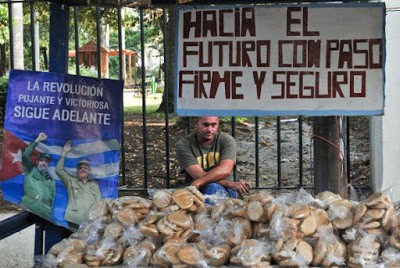“Based on the lessons of history, those who still believe ‘self-employment’ licenses are ‘a step in the right direction’ toward capitalism, actually have all the more reason to support U.S. sanctions.”
To understand why:
First and foremost, from an economic perspective, the very concept of trade and investment in Cuba is grounded in a misconception about how “business” takes place on the island. In most of the world, trade and investment means dealing with privately-owned or operated corporations. That’s not the case in Cuba. In Cuba, foreign trade and investment is the exclusive domain of the state, i.e. Fidel and Raul Castro. There are no “exceptions.”
Here’s a fact: In the last five decades, every single “foreign trade” transaction with Cuba has been with a state entity, or individual acting on behalf of the state. The state’s exclusivity regarding trade and investment was enshrined in Article 18 of Castro’s 1976 Constitution.
Unfortunately, President Obama chose to ignore history for the sake of his legacy.
Thus, we’re now seeing how Obama’s policy is stifling — rather than encouraging — private sector activity in Cuba.
Not only have the number of “self-employed” licensees dropped since December 17th, 2014, but the Castro regime no longer has any incentive (need) to liberalize Cuba’s economy.
Here’s why —
From Barrons:
Does Cuba Communist Party Want Foreign Investment?
Don’t expect much from the Cuban Communist Party congress to be held Saturday through April 19.
“The recent rapprochement with the United States will probably undermine the regime’s sense of urgency regarding the pace of liberalization on the island since it has led to an increase in dollar inflows from both remittances and increased tourism and reduced the need to expand local private sector activity,” say Eurasia Group analysts Risa Grais-Targow and Agata Ciesielska.
State media say that just 21% of the more than 300 economic updates announced at the last Communist congress were implemented, according to Eurasia Group. With debt forgiven by China, Russia, Mexico and Japan, Cuba is likely to take a “very gradual approach” to economic liberalization, the analysts say. While much attention has been paid to repression of citizens, consider this, again from Grais-Targow and Ciesielska:
“The government is also beholden to elite interests, which will continue to operate as a constraint to more substantive reform. Senior figures within the Revolutionary Armed Forces (FAR) have significant business interests in the country’s most important sectors, including sugar, tourism, and cigar production. In fact, the military’s holding company, GAE, reportedly employs 20% of Cuba’s workers and includes the island’s largest tourism corporation, real estate, retail, and warehouses, as well as the Mariel special trade zone, run by Castro’s son-in-law.”
Source: Capitol Hill Cubans

